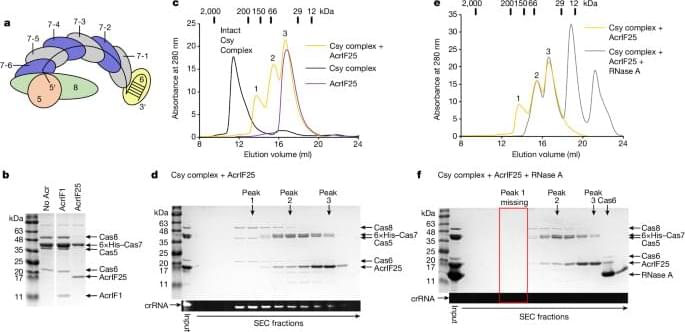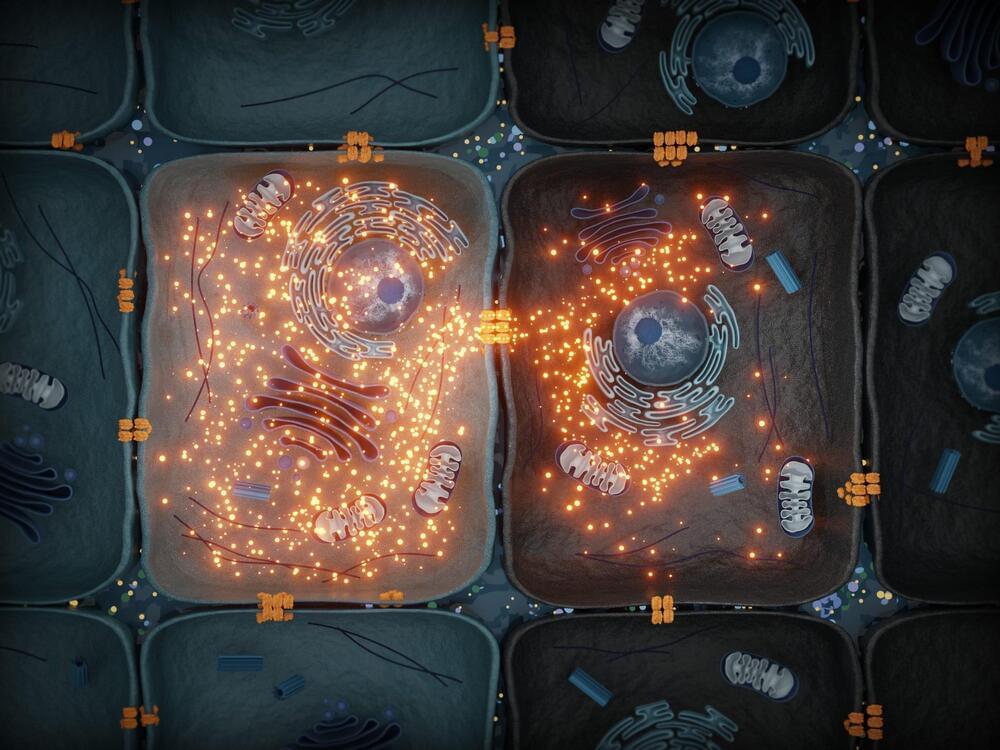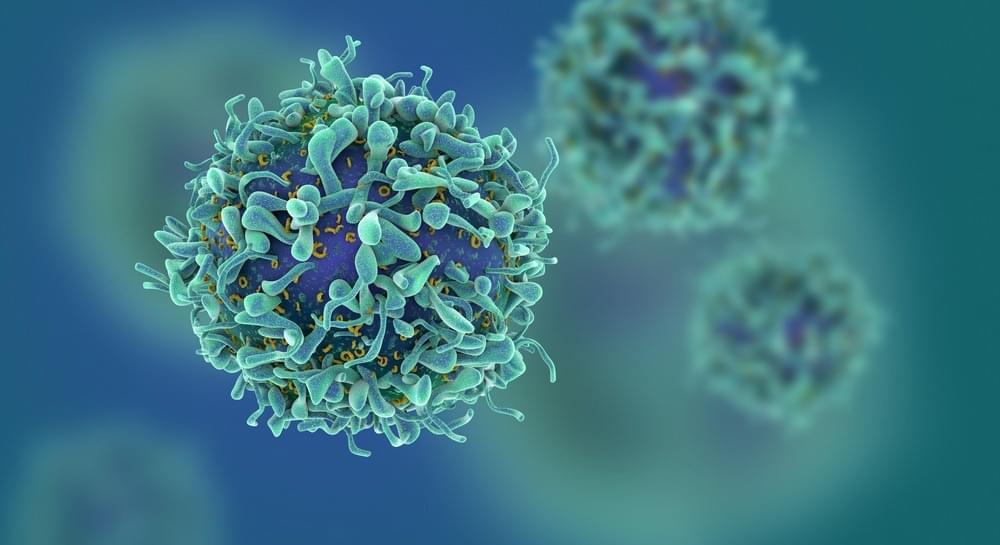AcrIF25 inhibits the type I-F CRISPR–Cas system by disassembling its ribonucleoprotein effector complex without an external energy source.



Researchers at Rice University are making strides in understanding how chromosome structures change throughout the cell’s life cycle. Their study on motorized processes that actively influence the organization of chromosomes appears in the Proceedings of the National Academy of Science.
“This research provides a deeper understanding of how motorized processes shape chromosome structures and influence cellular functions,” said Peter Wolynes, study co-author and the D.R. Bullard-Welch Foundation Professor of Science. Wolynes is also a professor of chemistry, biosciences, physics and astronomy and the co-director of the Center for Theoretical Biological Physics (CTBP).
The research introduces two types of motorized chain models: swimming motors and grappling motors. These motors play distinct roles in manipulating chromosome structure.

Understanding how transport networks, such as river systems, form and evolve is crucial to optimizing their stability and resilience. It turns out that networks are not all alike. Tree-like structures are adequate for transport, while networks containing loops are more damage-resistant. What conditions favor the formation of loops?
Researchers from the Faculty of Physics at the University of Warsaw and the University of Arkansas sought to answer this question. The findings, published in Physical Review Letters, show that networks tend to form stable loop structures when flow fluctuations are appropriately tuned. This finding will allow us to understand the structure of dynamic transport networks better.
Transport networks, like blood vessels or river systems, are essential for many natural and human-made systems. Understanding how these networks form and grow is crucial for optimizing their stability and resilience.

New findings reveal that individuals with an average sense of smell may unknowingly be living with natural gas leaks. According to a peer-reviewed study in the scientific journal Environmental Research Letters, minor leaks can deteriorate indoor air quality by emitting various hazardous pollutants, such as benzene—a carcinogen detected in 97% of natural gas samples throughout North America.
“While these smaller leaks are not large enough to cause gas explosions, hard-to-smell leaks are common,” said lead author and PSE Healthy Energy Scientist Sebastian Rowland. “The fact that they are so small makes them hard to identify and fix, which can lead to a persistent indoor source of benzene and methane.”

Researchers found that inhibiting the degradation of vitamin B6 in cells using 7,8-Dihydroxyflavone enhances brain functions and could offer a new treatment method for mental and neurodegenerative disorders.
Vitamin B6 plays a crucial role in brain metabolism. Consequently, low levels of vitamin B6 are linked to memory and learning impairments, depressive moods, and clinical depression in various mental disorders. In the elderly, insufficient vitamin B6 is associated with memory decline and dementia.
Although some of these observations were made decades ago, the exact role of vitamin B6 in mental illness is still largely unclear. What is clear, however, is that an increased intake of vitamin B6 alone, for example in the form of dietary supplements, is insufficient to prevent or treat disorders of brain function.

Researchers have advanced their understanding of how drugs interact with connexin molecules. Connexins create channels that enable direct communication between adjacent cells. Dysfunctions in these channels play a role in neurological and cardiac disorders. This enhanced knowledge of drug binding and action on connexins could aid in developing treatments for these diseases.
Today we use many electronic means to communicate, but sometimes dropping a note in a neighbor’s letter box or leaving a cake on a doorstep is most effective. Cells too have ways to send direct messages to their neighbors.
Adjacent cells can communicate directly through relatively large channels called gap junctions, which allow cells to freely exchange small molecules and ions with each other or with the outside environment. In this way, they can coordinate activities in the tissues or organs that they compose and maintain homeostasis.

In a recent study published in Immunology, researchers investigated populations of regulatory T cells (Treg), a type of white blood cell, in various tissues.
Researchers at the University of Cambridge have identified that regulatory T cells exist as a large, mobile population that continuously travels through the body to locate and repair damaged tissue.


Researchers have suspected for some time that the link between our gut and brain plays a role in the development of Parkinson’s disease.
A new study just identified gut microbes likely to be involved and linked them with decreased riboflavin (vitamin B2) and biotin (vitamin B7), pointing the way to an unexpectedly simple treatment that may help: B vitamins.
“Supplementation of riboflavin and/or biotin is likely to be beneficial in a subset of Parkinson’s disease patients, in which gut dysbiosis plays pivotal roles,” Nagoya University medical researcher Hiroshi Nishiwaki and colleagues write in their published paper.

A modern long-range wide-body airliner like the Airbus A350 takes 15 hours of non-stop flying to travel from Los Angeles to Sydney. This makes it one of the longest and most tiring airline routes for passengers. But imagine an aircraft that will reduce travel time between the two cities to just 3 hours. Sounds unrealistic, right? After all, the jet should be capable of flying multiple times the speed of sound to achieve that feat. However, the grandson of aviation giant Bombardier, Charles Bombardier, believes the technology to build such an ambitious aircraft will be available in the foreseeable future. A mechanical engineer by education, Charles leads a nonprofit organization named Imaginactive, which has created multitudes of highly-ambitious, world-changing concepts over the last few years. The Paradoxal hypersonic jet concept is one of them, and it is designed to travel at Mach 24 (nearly 16,000 mph). At this speed, it can fly out of JFK and land at Heathrow, London, covering a distance of 3,450 miles in 11 minutes. Yes, you read that right.

According to its designer, Juan Garcia Mansilla, the development of the Paradoxal concept involved numerous scientists and engineers, including some professionals from NASA. You won’t be wrong if you think the conceptual hypersonic aircraft looks like a futuristic version of the B2 stealth bomber. Both of them are strikingly similar to the peregrine falcon, the world’s fastest bird, during its dive to catch its prey.
Also read — Inspired by the Viking Ships and aptly named ‘Norway’ — This 528-foot long superyacht concept has solar sails, a sky elevator, cinema, supercar garage and even a hospital.